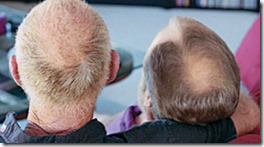 At a recent senior services visioning meeting for the City of Thousand Oaks, our table group came up with our future vision: “A community that provides easy-to-navigate and ongoing support of quality of life throughout the aging process.”
At a recent senior services visioning meeting for the City of Thousand Oaks, our table group came up with our future vision: “A community that provides easy-to-navigate and ongoing support of quality of life throughout the aging process.”
I think about this vision a lot as it pertains to lesbian, gay, bisexual and transgender seniors.
Today’s LGBT elders are the last generation to have lived their childhood and young adulthood in hiding. They grew up at a time when there was no concept of “coming out” to family and friends because the disclosure could lead to institutionalization. I know this from observational experience.
One high school summer in the early ’70s, I had a job at a private mental health facility doing administrative work with my mom. I remember asking my mother what might be wrong with this nice young man I’d seen around the facility. She told me he was homosexual and his parents placed him in the facility to “fix him.”
That nice young man would be around 65 today, entering seniorhood at a time when 17 states and the District of Columbia have legalized same-sex marriage and the U.S. Congress has repealed the “don’t ask, don’t tell” policy.
At this time when LGBT individuals are experiencing a record level of social and legal protection, one might think life for LGBT seniors is getting easier. Just the opposite is true. As a whole, LGBT elders are facing significant hardships.
It helps to understand the demographics of this group to see where some of the challenges lie.
LGBT elders are more likely to be single and live alone, and are less likely to have children than their non-LGBT peers. Because of this, and because LGBT elders are often estranged from their families of origin, they frequently rely on “chosen families” for support and caregiving.
Relying on a small circle of friends, LGBT elders don’t have the benefit of intergenerational support and often are being cared for by those at the same stage in the aging process.
According to studies, LGBT elders lag well behind their non- LGBT peers on all economic indicators. This means LGBT seniors often do not have the financial means to pay for the care they need and may end up with no choice but to receive government-funded supportive services or nursing care.
Especially in the elder world, there is an enduring stigma attached to homosexuality and gender variance.
LGBT elders are often referred to as “Gen Silent.” Because they’re so afraid of discrimination by caregivers or bullying by other seniors, many simply go back into the closet.
About a year ago I watched a critically acclaimed documentary called, in fact, “Gen Silent,” which follows six LGBT elders as they navigate the care system in their old age.
The film asks the question, “What would you do if you were old, disabled or ill and the person feeding you put down the spoon and said that you are going to hell unless you change your sexual preference?”
Many LGBT elders say they have a visceral fear that they will experience anti-LGBT bias when they are the most vulnerable and the least able to fight back.
In addition to fear, LGBT elders also have a legally fragile support system. Frequently their legal documents don’t adequately acknowledge their partner relationships or memorialize their wishes.
When decisions need to be made, estranged family members are sometimes consulted for decision making instead of an LGBT elder’s long-standing partner.
For those advocating for elders in our community, many of us need to learn more about this topic so that we can be a community that provides all seniors easy-to-navigate and ongoing support of quality of life throughout the aging process.
To that end, Ventura County Behavioral Health will present a Cultural Competence Professional Development Seminar from 1:30 to 3:30 p.m. Tues., June 3 at the Simi Valley Senior Center, 3900 Avenida Simi.
To register, send an email to vcbh.training@ventura.org. Include your name, organization (if any), mailing address, telephone number and email address. If you are a professional applying for continuing education units, please include your license number. For more information, call (805) 981-1101.
More ...
Tags: LGBT seniors,Gen Silent